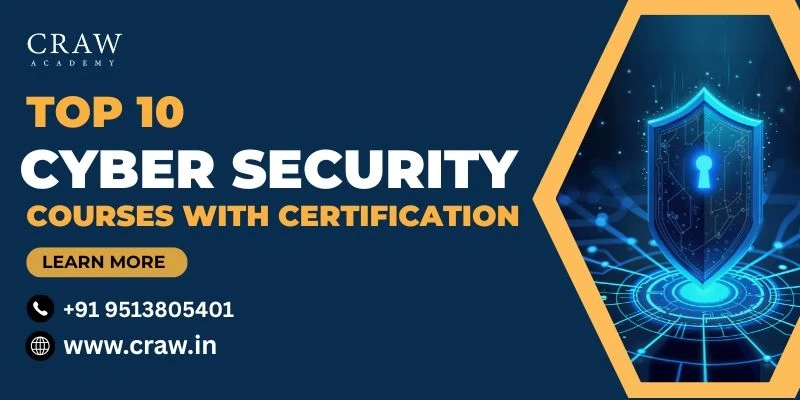Why Cybersecurity Courses Are Essential in 2025?
A certified cybersecurity Course gives better job security, higher salary prospects, and access to top-tier career opportunities. AI-powered security training is making it easier to detect threats and automate protection mechanisms.
Taking a cybersecurity course gives you practical experience, a recognized certification, and an advantage in the job market.
Top 10 Cyber Security Courses With Certification in 2025
1. Basic Networking Course with AI
A strong foundation in the Basic Networking Course is crucial for cybersecurity. Understanding how data flows through networks helps professionals secure systems from cyber threats.
This course covers:
TCP/IP fundamentals and firewalls
AI-driven network security solutions
Packet analysis for threat detection
2. Linux Essential Course
Linux Essential Course is the backbone of cybersecurity. Most servers and security tools run on Linux, making it essential for security professionals.
What you’ll learn:
Linux command-line security
Firewall configuration and user management
File encryption and access control
3. Python Programming for Cybersecurity
One of the most powerful Python programming languages for cybersecurity. It helps in automating security tasks, malware analysis, and penetration testing.
Key topics include:
Writing security scripts
Automating ethical hacking techniques
AI-powered threat detection
4. Ethical Hacking Course with AI
Ethical hackers think like cybercriminals to protect systems from attacks. This Ethical Hacking Course with AI is one of the most in-demand cybersecurity programs.
What you’ll learn:
AI-enhanced penetration testing
Hands-on ethical hacking techniques
Real-world cybersecurity simulations
5. Penetration Testing Course with AI
Penetration testing (pen-testing) is critical for identifying security vulnerabilities. Penetration Testing Course with AI help security professionals perform advanced testing efficiently.
This course covers:
AI-based penetration testing tools
Vulnerability assessment techniques
Exploit development and security auditing
6. Cyber Forensics with FTK Tool
Cyber Forensics with FTK Tool is essential for investigating cybercrimes. The FTK (Forensic Toolkit) is widely used by security professionals to analyze digital evidence.
What you’ll learn:
Digital evidence collection and preservation
Malware analysis and reverse engineering
AI-assisted forensic investigation
7. Web Application Security Course with AI
Web applications are a major target for c yberattacks. This Web Application Security Course with AI course teaches how to secure websites and web-based systems using AI.
Key topics include:
AI-based vulnerability scanning
SQL injection, XSS, and CSRF attacks
Web application firewall (WAF) setup
8. Mobile Application Security Course
With mobile threats on the rise, securing mobile applications is more important than ever. This mobile application course will help you to secure your smartphone
This course covers:
Securing Android and iOS applications
Reverse engineering and penetration testing
AI-driven mobile security solutions
9. IoT Pentesting Course
The Internet of Things (IoT) is expanding rapidly, but security risks remain high. This IoT Pentesting course focuses on protecting smart devices from cyberattacks.
Topics covered:
IoT attack vectors and vulnerabilities
AI-driven IoT security techniques
Practical penetration testing for IoT
10. End-Point Security & AWS Security
With End-Point Security and AWS Security, cloud computing is now essential for businesses. It is important to secure endpoints and cloud environments.
This course teaches:
AI-driven cloud security strategies
AWS security best practices
End-user device protection techniques
How to Choose the Right Cybersecurity Course?
Choosing the right cybersecurity course depends on your career goals.
Beginners should start with Basic Networking and Linux.
Developers can focus on Python for Cybersecurity.
Security professionals should consider Ethical Hacking and Penetration Testing.
Cloud and IoT enthusiasts should explore AWS Security and IoT Pentesting.
Look for accredited certifications and courses that provide hands-on experience to maximize learning.
Conclusion
Cybersecurity is an ever-growing field with endless career opportunities. As cyber threats evolve, professionals must stay ahead with AI-driven security solutions.
By taking one of these top 10 courses, you will learn important skills. You will also earn certifications. These will help protect businesses and people from cyberattacks.
The future of cybersecurity is bright—start learning today and secure your place in this high-demand industry!
FAQs
1. Will cybersecurity be in demand in 2025?
Yes, cybersecurity jobs will stay in high demand. This is because of rising cyber threats and more use of digital technology.
2. Which certificate is best for cybersecurity?
The best cybersecurity certifications include CEH, OSCP, CISSP, CompTIA Security+, and AWS Security.
3. What is the future of cybersecurity in the next 10 years?
Cybersecurity will focus on AI-driven security automation, quantum computing security, and zero-trust architectures.
4. Which course is best for cybersecurity?
The best course depends on your interests. Ethical Hacking, Penetration Testing, and Cloud Security are among the top choices.
5. Which field of cybersecurity is best?
The most lucrative fields include ethical hacking, penetration testing, cloud security, AI-driven security, and digital forensics.


